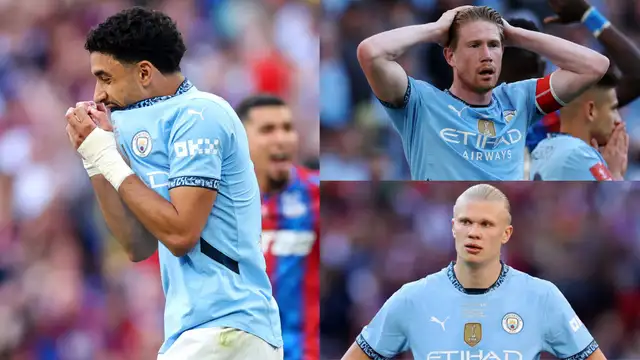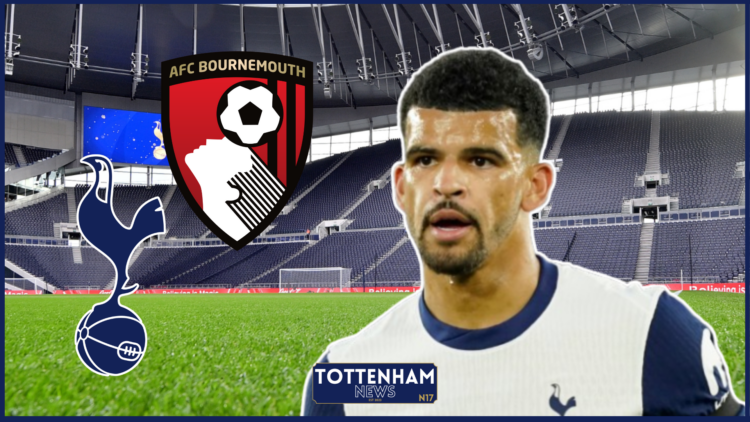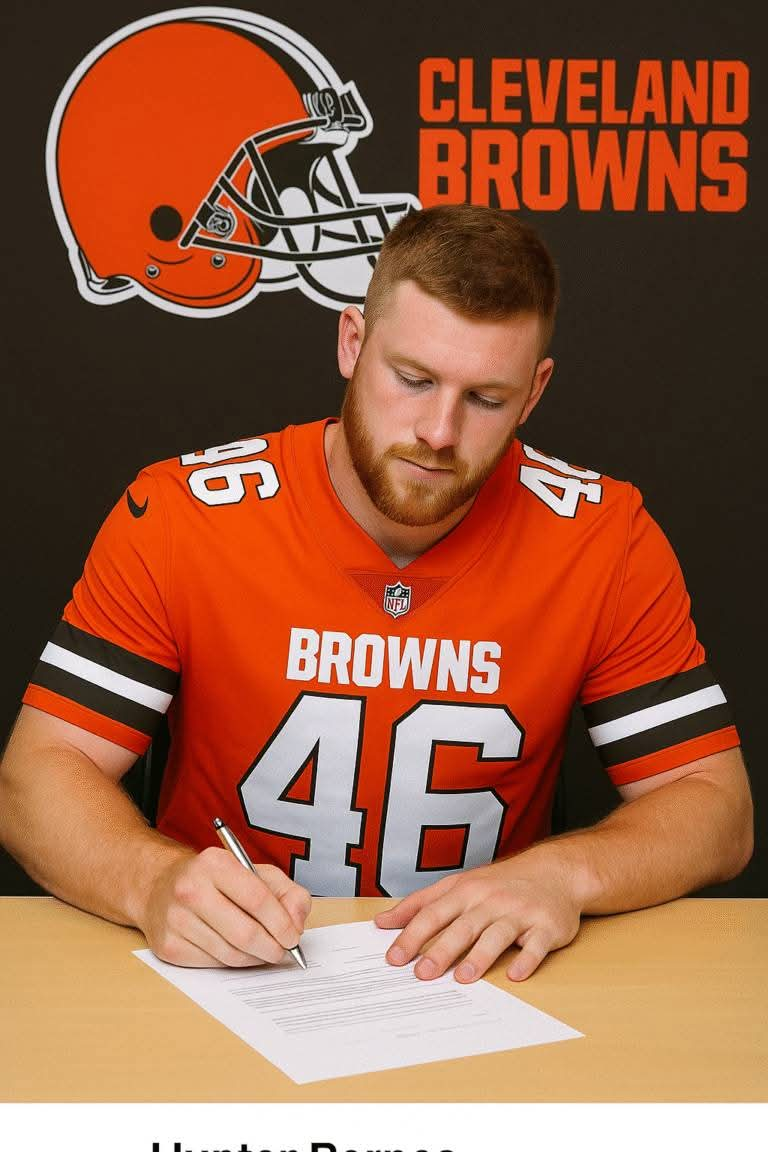Crystal Palace’s stunning 1-0 victory over Manchester City in the FA Cup final will go down as one of the most significant upsets in recent football history. Pep Guardiola’s side, often considered unstoppable domestically, found themselves outfoxed and outfought at Wembley Stadium in what was supposed to be a grand farewell for Belgian maestro Kevin De Bruyne. Instead, on a sun-drenched Saturday afternoon that promised glory, City slumped to their second consecutive cup final defeat, raising serious questions about Guardiola’s decision-making in the biggest moments.
The day began with an emotional tribute to De Bruyne, with City fans unfurling an impressive tifo funded partially by Erling Haaland himself. Yet the afternoon would end with the Belgian midfield maestro trudging off the pitch, his final appearance in a City shirt at Wembley ending not with silverware, but with the bitter taste of defeat.
TACTICAL CATASTROPHE: GUARDIOLA’S OVERTHINKING STRIKES AGAIN
The fundamental story of this final revolves around Guardiola’s tactical approach, which can only be described as a catastrophic miscalculation. In a move eerily reminiscent of the 2021 Champions League final defeat to Chelsea, the Catalan coach abandoned conventional wisdom by fielding no natural holding midfielders. This left Kevin De Bruyne and Bernardo Silva – creative playmakers by trade – to operate as makeshift defensive shields.
This audacious setup appeared designed to accommodate an almost comically attack-heavy formation featuring Omar Marmoush, Savinho, Jeremy Doku, and Erling Haaland simultaneously. The strategy sacrificed the midfield balance that has been fundamental to City’s success over the years, effectively neutering De Bruyne’s influence by positioning him far too deep to exercise his creative powers.
“It was a formation that screamed of overthinking,” noted former City captain Vincent Kompany from the BBC commentary box. “When you have a player of Kevin’s caliber in his final game for the club, you want him where he can hurt the opposition most – not performing defensive duties in unfamiliar areas.”
The early stages seemed to vindicate Guardiola’s approach as City pinned Palace back, dominating possession with their usual metronomic passing. However, this territorial advantage produced few clear-cut chances, with Palace’s defensive unit maintaining shape under pressure. Football matches are often decided by moments rather than patterns, and the game’s complexion changed dramatically with Palace’s first meaningful attack.
THE DECISIVE MOMENT: EZE STUNS THE CHAMPIONS
In the 27th minute, Crystal Palace broke forward through Daniel Munoz down the right flank. The Colombian full-back delivered a precise low cross into the path of Eberechi Eze – ironically, a player City have pursued in recent transfer windows. Eze, ghosting into space neglected by Manuel Akanji, met the ball with perfect timing, stroking a first-time finish beyond Stefan Ortega.
The goal showcased everything Palace manager Oliver Glasner has built during his first season in charge: defensive solidity, disciplined shape, and lightning-quick transitions. For City, it highlighted the defensive frailties created by Guardiola’s unorthodox system, with Akanji – a center-back asked to play as a full-back – caught out of position when it mattered most.
As the Palace fans erupted in celebration, a palpable sense of anxiety spread through the City ranks. Despite their technical superiority, they suddenly looked vulnerable, their usually immaculate composure showing signs of cracking.
CONTROVERSY AND PIVOTAL MOMENTS
The match was not without controversy. In the 34th minute, Palace goalkeeper Dean Henderson appeared to handle the ball outside his penalty area when rushing out to deny Haaland. Despite fervent protests from City players and bench, referee Michael Oliver waved play on, and VAR – unable to intervene on such decisions – could not provide a second look.
Former Manchester United defender Gary Neville, speaking on Sky Sports, called it “a clear and obvious error that could have changed the entire complexion of the final. Henderson knew exactly what he was doing and got away with one there.”
City’s frustration turned to hope when they were awarded a penalty ten minutes before halftime. Bernardo Silva, one of City’s brighter performers, was brought down by Tyrick Mitchell’s late challenge. What followed was perhaps the most telling moment of the entire match: Omar Marmoush, rather than penalty specialist Haaland, stepped up to take the spot-kick.
The Egyptian forward, who has enjoyed a largely successful debut season at the Etihad, struck his effort with power but at a comfortable height for Henderson, who dived correctly to his left to palm the ball away. The save sent the Palace end into raptures while leaving City fans bewildered as to why their 38-goal Norwegian marksman had been bypassed for such a crucial moment.
“That’s a decision that will haunt Omar for some time,” said former City striker Sergio Aguero, watching from the studio. “In these moments, you want your top goalscorer taking responsibility. It’s a psychological blow when your main penalty taker surrenders that duty and the replacement fails.”
SECOND HALF: DESPERATION WITHOUT INSPIRATION
The second half followed a predictable pattern as City launched wave after wave of attacks against Palace’s increasingly entrenched defense. Guardiola’s side monopolized possession (finishing with 73% of the ball) but struggled to translate this dominance into clear opportunities.
Palace, meanwhile, remained dangerous on the counter-attack. They thought they had doubled their advantage when Daniel Munoz struck at the near post following another rapid break, only for the goal to be ruled out for offside against Ismaila Sarr in the build-up. This reprieve did little to galvanize City, who continued to look uncharacteristically disjointed.
As the clock ticked down, City’s efforts grew increasingly desperate. Haaland skied one opportunity from 12 yards and then headed over from a Phil Foden corner. Perhaps most telling was the sight of De Bruyne, in what could be his final meaningful contribution for the club, dragging a shot wide from the edge of the box in stoppage time – a chance he would have buried in his prime.
When the final whistle sounded after five minutes of added time, the contrast between the teams could not have been starker: Palace players collapsed to the turf in elation while City’s stars stood shell-shocked, the realization of another Wembley failure sinking in.
PLAYER PERFORMANCES: INDIVIDUAL ASSESSMENTS
Goalkeeping & Defense
Stefan Ortega (5/10): The German goalkeeper could do little about Eze’s finish and made a solid save from Mateta in the second half. His distribution remained reliable throughout, but this will be another disappointing final for Ortega, who has now lost two FA Cup finals in succession.
Manuel Akanji (4/10): The Swiss international was caught out of position for Palace’s goal, losing track of Eze at the critical moment. While he offered occasional attacking support, his defensive limitations as a makeshift right-back were exposed by Palace’s direct approach. A near miss in communication with Dias could have proved even more costly.
Ruben Dias (6/10): The Portuguese center-back was the most composed member of City’s back line, generally handling Mateta well and organizing those around him effectively. His distribution was typically precise, but he couldn’t compensate for the structural issues created by Guardiola’s system.
Josko Gvardiol (6/10): The Croatian made several important defensive interventions, particularly a crucial tackle to prevent Munoz from breaking free again after the goal. Going forward, he tested Henderson with a powerful drive in the first half and provided width when Doku drifted inside.
Nico O’Reilly (5/10): The young midfielder found himself deployed unusually high up the pitch, which left him out of position when Palace counter-attacked for their goal. Had a decent opportunity in the second half but took too long to pull the trigger, allowing Mitchell to make a critical block.
Midfield
Bernardo Silva (6/10): One of City’s better performers on a disappointing day. The Portuguese midfielder worked tirelessly, won the penalty, and tried to provide the creative spark that was largely missing elsewhere. His removal for Gundogan in the closing stages was questionable given his influence.
Kevin De Bruyne (5/10): Not the Wembley farewell the Belgian deserved. Constrained by tactical instructions that positioned him far deeper than ideal, De Bruyne struggled to influence proceedings in the final third where his vision and execution usually prove decisive. His missed opportunity in stoppage time epitomized a frustrating afternoon.
Attack
Jeremy Doku (7/10): The Belgian winger was City’s most consistent attacking threat, repeatedly beating Munoz down the left flank. Forced Henderson into his best save of the match with a curling effort destined for the top corner. His directness and pace offered City’s clearest route to goal.
Savinho (6/10): The Brazilian started brightly, causing problems with his movement between the lines, but his influence waned as Palace settled into their defensive shape. Eventually



